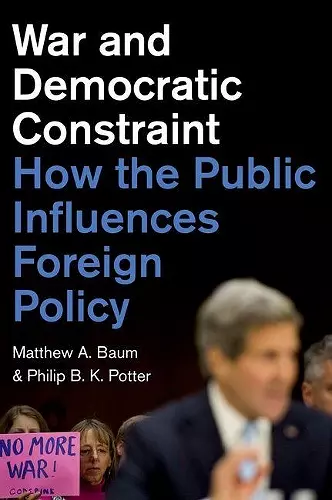War and Democratic Constraint
How the Public Influences Foreign Policy
Matthew A Baum author Philip B K Potter author
Format:Hardback
Publisher:Princeton University Press
Published:12th May '15
Currently unavailable, and unfortunately no date known when it will be back
This hardback is available in another edition too:
- Paperback£30.00(9780691165233)

Why do some democracies reflect their citizens' foreign policy preferences better than others? What roles do the media, political parties, and the electoral system play in a democracy's decision to join or avoid a war? War and Democratic Constraint shows that the key to how a government determines foreign policy rests on the transmission and availability of information. Citizens successfully hold their democratic governments accountable and a distinctive foreign policy emerges when two vital institutions--a diverse and independent political opposition and a robust media--are present to make timely information accessible. Matthew Baum and Philip Potter demonstrate that there must first be a politically potent opposition that can blow the whistle when a leader missteps. This counteracts leaders' incentives to obscure and misrepresent. Second, healthy media institutions must be in place and widely accessible in order to relay information from whistle-blowers to the public. Baum and Potter explore this communication mechanism during three different phases of international conflicts: when states initiate wars, when they respond to challenges from other states, or when they join preexisting groups of actors engaged in conflicts. Examining recent wars, including those in Afghanistan and Iraq, War and Democratic Constraint links domestic politics and mass media to international relations in a brand-new way.
One of Choice's Outstanding Academic Titles for 2015 "[A] groundbreaking study."--Foreign Affairs "This scholarly book is an important contribution to the role of political communication in foreign policy making. It is strongly recommended for foreign policy and political communication scholars and democratic peace theorists."--Choice "A very thoughtful study about war initiation which can be the start for a true sociology of democratic institutions and their impact on war and peace."--Thomas Lindemann, European Review of International Studies "Why are some democracies more sensitive than others to the foreign policy preferences of citizens? The answer that the book presents to this research question is innovative, thoroughly argued and consistently backed up by solid empirical research... A seminal reading recommended for all scholars interested in the way domestic factors influence foreign policy."--Cristian Nitoiu, Political Studies Review
- Short-listed for Choice Magazine Outstanding Reference/Academic Book Award 2015
ISBN: 9780691164984
Dimensions: unknown
Weight: 510g
280 pages